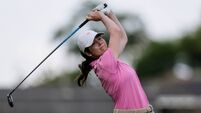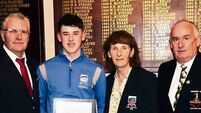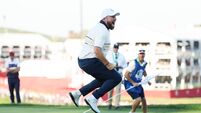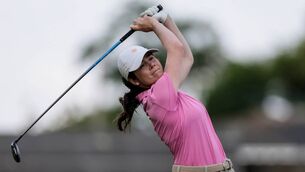Harrington remains one of Ireland’s greatest
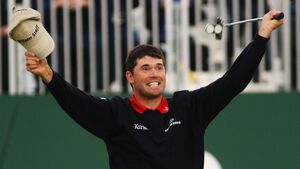
Padraig Harrington celebrates after defeating Sergio Garcia in a playoff to win the 136th Open Championship in Carnoustie back in 2007. Picture: INPHO/Getty Images
We all love to engage with some nostalgia from time to time. In a sporting sense, when you’re with your friends or family, reminiscing on times past of a famous victory or key moment for your team or sportsperson of choice can evoke the best of memories from a point in life when everything seemed tip top.
During the week, I got to thinking about my top three. Chief among them is, unsurprisingly, related to Sligo football. Eamonn O’Hara’s goal against Galway in the 2007 Connacht final will take some beating.
In second, I put Matt Holland’s goal for the Republic of Ireland against Cameroon in their opening match at the World Cup finals in 2002. That was the first World Cup I can remember – and Holland’s sweet strike set Ireland up for a decent run, which eventually ended in cruel fashion against Spain in the last 16.
Third was Padraig Harrington’s win at the 2007 Open Championship.
As an impressionable youngster at the time of the Dubliner’s major breakthrough, I remember being consumed by that triumph at the daunting Scottish links that is Carnoustie. It was a drama filled final day, during which Harrington – having had a pretty good career up until then without claiming one of the big prizes – almost passed up the chance to finally clinch a major title with a double bogey at the 18th. He hit the ball in the water twice.
Eventually, he emerged as the champion after a play-off victory over Sergio Garcia, who watched a 10-footer slide by on the final green in regulation play which would have seen him lift the Claret Jug.
So fickle is the sport that Garcia, widely considered one of the most talented players of the modern era, had to wait a full decade before he’d enter the winners enclosure at a major championship eventually coming good to win the Masters at Augusta.
The one standout moment from Harrington’s win, in my memory, was his pitch to the 72nd hole. Having just hit the ball into the burn twice, Harrington zipped in a beautiful pitch that skidded, then spun, and came to rest three feet from the hole. For many, under that pressure and with what had just gone before, a shot like that would have been too risky but his mindset to get up and down and salvage a double bogey ultimately got him into the play-off that won him the Championship.
All of these memories, and more, are flooding back for many in the game of golf these days as Harrington last night was inducted into the World Golf Hall of Fame.
In joining that illustrious club, Harrington’s achievements become even more impressive when you stack them up against others who have been included yet their trophy haul is rather more modest. It’s important to remember that during the period in which Harrington claimed three major titles in the space of 14 months, he was perhaps the best player in the world. And, he has said himself he felt he actually played better golf in the following two years but that wasn’t matched by a better set of results.
Back-to-back Open titles was a rare feat and winning the US PGA Championship in 2008 proved the gritty Dubliner wasn’t just a one trick pony capable of beating the best in the world across links terrain – he could face up to and stare down the field in any setting.
While Harrington is the third Irishman to be given Hall of Fame status (Christy O’Connor Snr and Joe Carr being the others), it’s hard to argue with the assertion that he has been the player to have had the biggest impact on professional golf in Ireland.
Harrington’s breakthrough in the major arena helped open the floodgates for Irish players to nab one of the four big tournaments a year, having had such a barren run stretching all the way back to Fred Daly and the 1947 Open Championship.
Rory McIlroy’s ascent to the top of the game was widely tipped and it was no surprise to see him claim four majors relatively early in his career, but the breakthroughs for the likes of Darren Clarke and Graeme McDowell undoubtedly had roots in being inspired and encouraged by the progress of Harrington in 2007 and 2008. Similarly, though his Open triumph came over a decade later, Shane Lowry too has spoken of his admiration for Harrington.
Why have we such reason to be proud of Harrington, now 52, as one of our great sportspeople? I think one of the major reasons he is someone to look up to is his ability as a competitor.
Watch him play and you’ll see someone straining every sinew, physically and mentally, to get the most out of his career. He has openly admitted to doubts when turning professional about whether it was the right thing to do and whether he was good enough to even make a living from professional golf. Yet when he thrust himself into that environment, he fully embraced it. Ask any golfer out there on tour and they’ll tell you Harrington is the hardest worker around. In interviews, he brims with enthusiasm and youthful wonder when speaking about the game of golf; he never tires in that ultimate chase towards perfection. Around his house in Dublin is a practice facility that shot to prominence over the course of the Covid pandemic, with his coaching videos reaching far and wide.
Harrington's indefatigable grit and determination is what makes him one of our great sportspeople.
You can argue the case for many, many people across various disciplines. But I think you can define success at that level as having gotten as much from your individual talents as you possibly could by leaving no stone unturned in your pursuit of achievement. In that sense, few Irish sportspeople come close to sustained success at the top of their game than Harrington, who has achieved far beyond what was ever expected of him.
For that alone his place amongst golf’s finest players is richly deserved.
